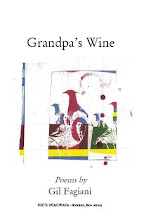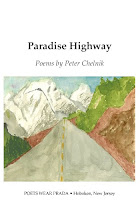
Robert KramerRAPTOR RHAPSODY By Susan Maurer Poets Wear Prada, 533 Bloomfield Street, 2nd Floor, Hoboken, NJ 07030, 2007, 14 pp. $8. | |
| |
Susan Maurer begins her recollectin with an epigraph from Carolyn Kizer: "I am passionatley opposed to the notion held for so long that women's true subjects are 'love and loss.'" Indeed, who could deny the absurdity of any such limiting concept? Yet most of her poems actually do deal with intense relationships between men and women. Written in a variety of tones, they often capture fraught moments between lovers or would-be lovers, while illuminating their sublime tensions and anxieties. In the following lines I would like to clarify her particular talent for obliquie psychological insights. The poem "Blossom" begins with a rather sarcastic question: "Want my wanting/ on ice?" The speaker recognizes the important role a woman's desire may play in a relationsip, realizes in fact her need is a significant factor in holding on to her man. The idea of somehow preserving her "wanting" on ice--maintaining it artificially--is crude and depressing; yet the woman pragmatically accept the situation. To her own rhetorical question "what's/ in it for me?"--she gives two answers: her sexual responsiveness will keep that man around and, if he stays around, she will have the possibility of hoping for something deeper and more intense, "that melt/ into a martini, that gin 'bite.'" The earlier image of ice now leads by association to a joyous experience from the past involving martinis: IThe initial tension, perhaps anger, disappears in the final scene of an idyllic moment of childhood returned and the overcoming of darkness. "Strativarius" is a witty account of an attempted communication that goes awry. The narrator address a certain "you" who is supposed to serve as the instrument of a reconciliation between the narrator and an alienated lover. The narrator dials her lover's number and hands the phone to "you", but instead of bringing her and her lover together, this "you" engages in a conversation with him, intruding into the former relationship, perhaps usurping it. The narrator responds with the laconic remark: "You're playing our song," masking her hurt by utilizing a witty variation on a cliche now turned negative. The title, of course, is ironic, since Stradivarius violins are esteemed the finest, while "you" has been an utter disaster as instrument. | |
Maurer is very skilled at exploiting cliches in a suprising manner. Her poem "Subject:" presents another example. I take the phone of the hook "The sound of silence" is an old paradox cleverly re-employed. "Silence" here is more than an absence of sound; it also refers to the awareness that someone who could and perhaps should call, but who does not. It combines uncertainty and hurt. But if one takes the phone of the hook, then there is no possibility of someone calling, there is no uncertainty, and there is less hurt, because the subject has become active and is "in control." In the last threes lines, however, the narrator changes her tactics and attempts herself to call the one who should have called, and the long, slender, pointed index finger used for dialing becomes the sword for committing emotional suicide, as no one answers. I must mention "Blue Rose," which does not at all explore the problematics of love and desire, but rather belongs in the tradition of Imagist poetry and certain Asian forms. Drop. Drop"Blue Rose" depices a remarkable metamorphis from the banality, even portentousness, of depositing drops of medicine in a glass of water--to a beautiful vision of the fluid slowly flowing into the shape of blue rose. It's unique in this volume in its precise observation of objects in the physical world and is one of the loveliest poems in the collection. There are other poems here that will make you laugh out loud, yet leave a somewhat bitter taste in your mouth. The overall tone of the book is wry, juanty, ironic, and stoic--a fresh and original voice. |



































































No comments:
Post a Comment